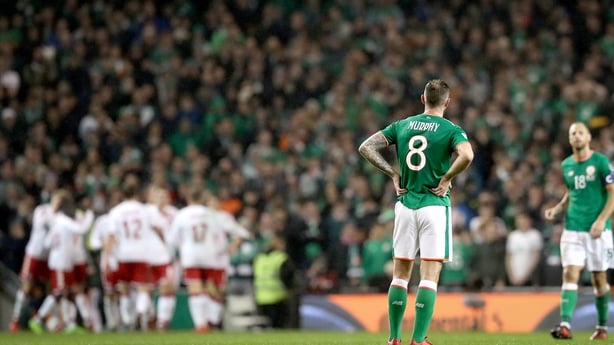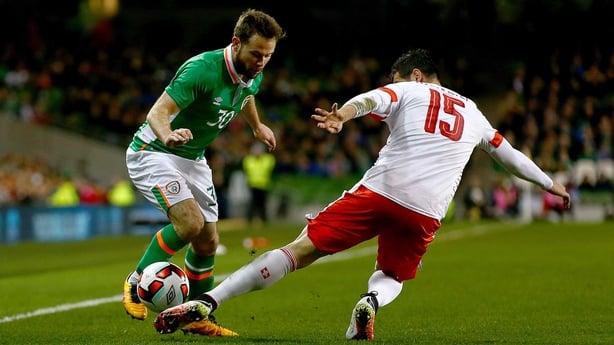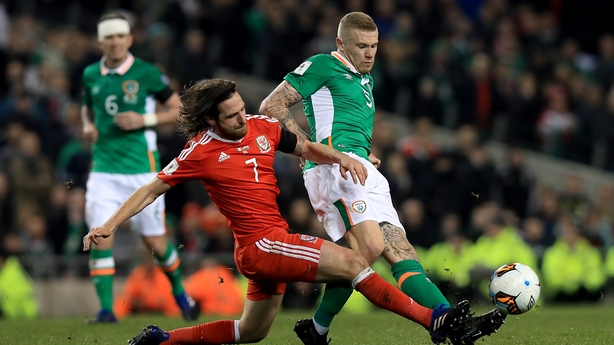When Martin O’Neill took control of the international side, the new manager had to wait a mammoth ten months before he could send out a side in a competitive fixture.
With almost a year to plan for that opening encounter – a 2-1 away win in Georgia – O’Neill used the time to build a squad that he believed could follow his instruction and help Ireland qualify for Euro 2016.
Job done at the first time of asking, the manager instantly took to international management and brought his side and the nation on an unforgettable journey to France in the summer of 2016.
Without delving into formations, player selection and team tactics, O’Neill’s second campaign was a success of sorts as he brought the team from fourth seed in the group to a second-place finish, as he guided the team to the play-offs.

The wheels came off that wagon in pretty spectacular fashion, getting handed a footballing lesson by Denmark at Lansdowne Road in a 5-1 defeat last November, which meant O’Neill' side would ultimately miss out on this summer’s World Cup.
So now the Ireland manager again finds himself in a limbo of sorts, in terms of competitive fixtures, as O’Neill must wait until 2019 to begin the qualifying campaign for Euro 2020.
It leaves the Ireland manager with another year to plan for his assault on the next major tournament and judging by the 30-man provisional squad that was named yesterday for the 23 March clash with Turkey, and associated warm-weather training camp, the manager appears to be ready to begin again.
An ageing squad fell at the final hurdle on that quest for World Cup qualification, and while only two senior players have officially announced their retirement, several more are expected, whether by choice or by managerial omission.
Glenn Whelan, John O’Shea, and perhaps Jon Walters and Aiden McGeady might fall into the latter bracket, while others like Robbie Brady and Callum O’Dowda are out injured and were never going to be available for this month’s match.
Darren Randolph and Stephen Ward, meanwhile, appear to have been handed a pass to skip this trip to the western Mediterranean resort.
The goalkeeping position is an intriguing one.
Randolph was certainly the number one choice for the last campaign and is currently playing every week for Middlesbrough who are currently in the play-off position as they attempt to gain Premier League promotion.
So in essence, this trip gives the manager a great chance to look at who is next in line, should injury or loss of form affect Randolph.
However, Keiren Westwood is named but currently injured, while Rob Elliot, who looked to be really pushing for that number one position ahead of Euro 2016 has not played for Newcastle in recent weeks, having been out injured, and in fact, cannot even get on the bench since the arrival of Martin Dubravka during the transfer window.
O’Neill is looking for new players to come in and improve his current options, and he certainly appears to be confident that there are several outfield players on the periphery with a real chance of breaking into his matchday thoughts.

And while several of the 30-man squad have limited international experience or have yet to be capped, they are far from inexperienced, with players like Alan Judge, Matt Doherty and Enda Stevens already on the wrong side of 25.
The Turkish adventure should allow O’Neill further options for the France game in May, and should things progress as he would wish, there is a fighting chance that there could be a real injection of new blood into the side for the first batch of competitive games, the Nations League, which starts in September.
LEAGUE B ✅#NationsLeague
— UEFA Nations League (@UEFAEURO) January 24, 2018
👉 https://t.co/qvCl76dWvT pic.twitter.com/bqpUoyOkyQ
O’Neill admitted at the press conference that he was keen to take the Nations League seriously, as it offers a possible route into the 2020 event.
"With young players coming through, we would have had a number of players, if we’d made it to Russia, who would definitely have been in the squad, so it’s a missed opportunity," said O’Neill.
"The new [Nations League] format, where, instead of friendly game, we have these matches that are meaningful. And I think they are something to look forward to.
"First of all, it is competitive football, and that’s very, very important, but again it’s an opportunity for some of the players to come in and set down a marker and say ‘I deserve to be in the squad’."
Whether or not O’Neill really believes these new arrivals can improve his squad remains to be seen.
Perhaps the manager feels the current squad need to be severely shaken from that Danish slumber.
And should the latest players perform, he will not have a problem passing the jersey on to the new recruit.
O’Neill admitted that it was a case of wait and see, but does believe that the three games before the summer should give him, at least, a good indication of who might be able to step up to that level and assimilate into his gameplan and philosophy.
"I’ll see how the development goes," said O’Neill.
"This game [versus Turkey] will be a difficult game away from home. Then we’re playing France who will be just about to head out to the World Cup and are as strong a team that is out there in Europe. And then we have a game at home against the USA."
O’Neill could have seen out this year of inactivity and waited until the Nations League to allow his current crop to bounce back from the Denmark match and prove themselves again in the 2020 qualifying campaign.
But the manager has chosen to treat Ireland’s year out as a transition year of sorts, and is anxious to be stronger and more competitive come September when they return to Wales for their inaugural Nations League encounter.

As mentioned, it is a waiting game to see where Ireland are at when it comes to those double-header clashes with old foes Wales and Denmark.
An impressive performance over the four games could offer Ireland a back door into the Euros in 2020, while a poor showing will see the Ireland manager draw a line under the experiment and refocus for the 2019 qualifying campaign.
"I believe the matches in September, October and November, outside the friendly games are competitive and if they have a bearing at all on the possibility of qualifying for the Euros, then we should be trying to go and be strong.
"But again, I reserve the right to change my mind," he joked. "They are important games, but they are not the be all and end all."
Perhaps the transition into a new-look Ireland might not be ready to reap rewards by the time the Nations League comes along this autumn.
The Euro 2020 qualifiers will offer a bigger picture as to whether O’Neill has completed the evolution of a new-look Ireland outfit, or whether the O’Neill era peaked three years previous during that summer in France.
If it’s the latter, there are more serious transitions that will be needed in Irish football.


